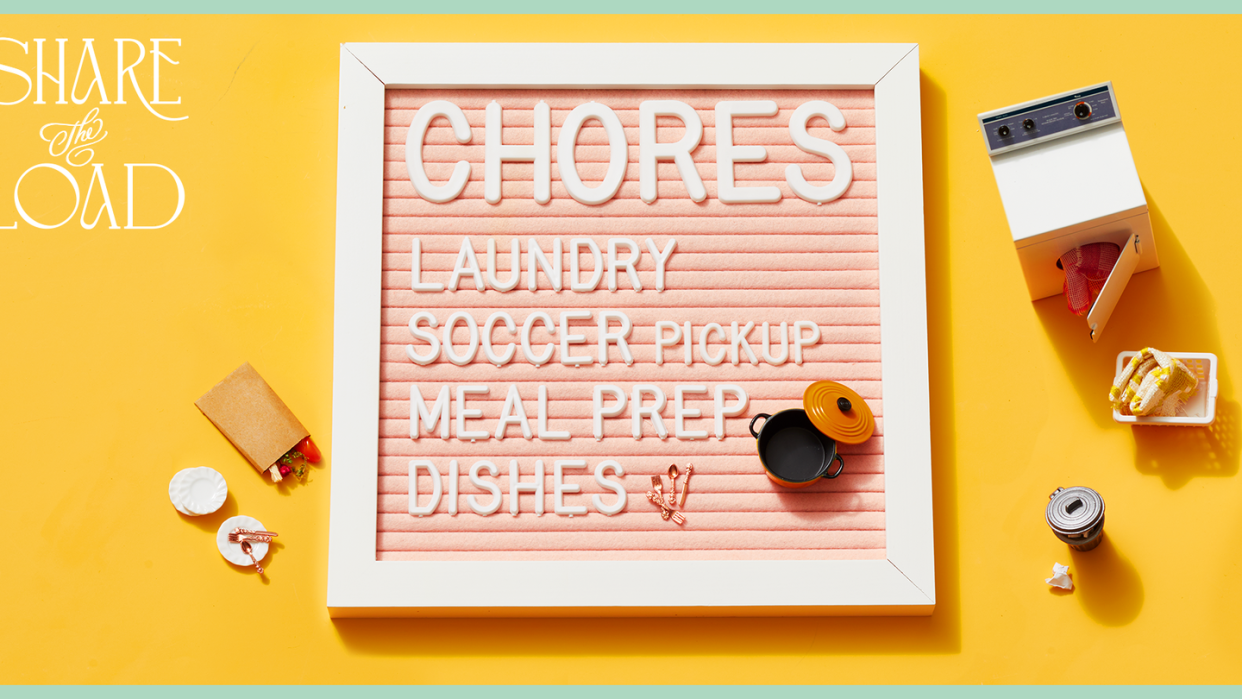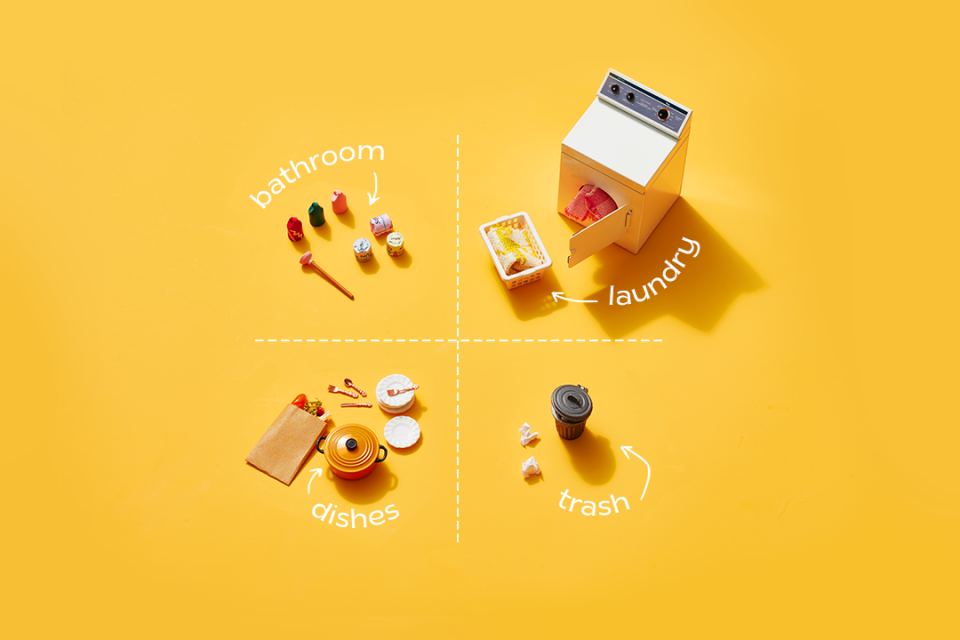What Families of Six or More Can Tell Us About Splitting Chores

Sharing the load between partners is hard enough. Now imagine the amount of laundry, dishes and clutter produced by large families with five, six, seven or more kids. How do they handle it all? Systems!
Through trial, error and experience, these families have become pros. They organize chores and get buy-in from their kids. Even the youngest members of the family share responsibility for the household. Each system is different, but here are some ideas that work.
Create Zones
Hannah Keeley raised seven kids in a 1,400-square-foot house in Virginia. She divided cleaning chores by area: the living room, the bathrooms, the hallway, etc. Each child was responsible for one zone, and assignments rotated weekly.
Even before her children could read, they participated. Keeley, who has a business as a “Mom Coach,” bought two-pocket aprons for the kids to wear and created little cards featuring simple chores like cleaning the doorknobs or wiping the kitchen counter. Each showed a picture of a task, and once the task on a card was completed the little ones moved the card from one pocket to the other. “With large families, it’s make-or-break, and you have to set up a system,” Keeley says.

Offer Clear Directions
“But I cleaned my room!” my daughter would say.
“Then why isn’t the bed made. and why are your clothes still all over the floor?” I’d retort. And so the bickering would begin.
If only I’d consulted Susan Chen, a Wisconsin mother of six who made a laminated sheet for each chore, specifying each task that the full job included. “You have to train them,” Chen explains. “The first couple of times we’ll go through it with them, then we’ll check back and say, ‘Oh, hey, you need to wipe around this part’ or whatever.”
Her children need to meet a certain benchmark for each chore to be considered complete, but the standard isn’t always perfection. “I base my standards on what they are actually capable of,” Chen adds. “Their bathroom isn’t spotless, but it’s clean enough.”
Make It a Family Affair
Along with daily responsibilities, most big families have “chore day” when they come together for big tasks. Many also gather at the end of the day to take stock of what has been done and address common areas that need straightening. “It’s a 30-minute regroup on how we did with our character, our activity level and our tasks,” Keeley says. Chen puts music on in the evening while everyone does a final tidying-up. The idea reinforces the idea of the family as a unit, jointly responsible for the household.
Kids also work together when largeeveryday chores are broken up into multiple tasks. In Christine Pinkley’s family of five kids, the two oldest, 10 and 12, load the dishwasher (which runs twice a day). The 11-year-old unloads it and puts the dishes away, while the 7-year-old puts away the utensils. Even the 2 1/2-year-old chips in, putting in the cleaning tablet and starting the load. Pinkley’s children become responsible for their own laundry starting at 7 or 8 years old. Around age 5, they begin folding and putting away their own clothes.
Pinkley, who lives in Virginia, doesn’t expect toddlers to accomplish much; the goal is to teach them the idea of pitching in. “Really it’s about raising a group of people who have a vested interest in the success of the house and the family as a whole,” she says. When a kid transitions to a new chore, the child who was doing it before takes a week to train his or her sibling.
Beware the Chore Divide
Boys mow the lawn and girls wash the dishes, right? Nope, not anymore. As Pinkley puts it, “My son is going into the world knowing how to fully clean the bathroom.” All the parents of big families I spoke to agree on this. “You’re going to have to do laundry whether you’re a boy or a girl,” Chen says.
fSpeaking of gender divides, you’ll note that it was all women, not men, who spoke up about managing chores. It may be 2023, but mothers generally continue to act as Chief Operating Officer of the household. That’s not to say fathers or partners don’t do housework; they do, and they also participate in designing and enforcing the system. But it still seems that it generally falls to women to get things organized in the first place.
For many men, working from home during COVID was a wake-up call. “He got a reality check,” says Pickney of her husband. “Before, he would do the dishes in the morning and think he was doing a great thing. He was smacked with the reality of how much chaos the kids create and how much he creates.”

How to Get Buy-In From Your Kids
If at this point you’re grinding your teeth and saying “I could never get my kids to do that,” here are some of the ways these families get cooperation.
✔️ Have Kids Help Design the System: “I wouldn’t set up a system and say, ‘Do it!’” Keeley advises. “I’d say, ‘I’m seeing we have a lot of tasks around. Tell me your ideas of help and what that would look like.’ If the child owns the task, they’ll complete it.”
✔️ Rewards and Consequences: Again, each family approaches it differently, but what’s consistent is that kids have incentives. Keeley has a point system that includes not just chores but also character, kindness to siblings, behavior and homework. In Chen’s household, kids earn (or lose) their allowances based on whether they complete chores. If a child refuses to do a chore, a sibling can do it for them and that sibling receives the other’s allowance too.
Kathryn Kreider, a New Jersey mother of four boys, uses Monopoly money to reward chores. She then opens a “store” every Sunday that she stocks with soda, snacks, toys and real money. Sometimes at the end of the week when kids are balking, she announces that it’s “Add a Dollar Day” and doubles the value of each chore. That usually gets the kids moving.
✔️ Consistency: Kids do better when they know what’s expected of them. Not only should expectations be consistent, but so should the consequences when chores aren’t completed.
✔️ On Pushback: “I’ve had a kid say, ‘I hate cleaning the bathrooms,’” says Keeley. “And I’m like, ‘I get it. There are going to be so many things in life you hate. Like I hate consolidating the bills every month.’” It’s not as much about a sparkling toilet as it is about building character. “The whole point is that they develop autonomy and self-sufficiency that will serve them as they become teenagers and adults.”
✔️Sibling Re-Enforcement: It’s not that you want to “parentify” your kids. But sometimes having sibling-to-sibling accountability makes the household run more smoothly. Keeley had one child be “the delegator” every night, responsible for making sure the table had been cleared and cleaned, the dishwasher had been loaded and the other dishes had been washed and put away. The role of delegator shifted every night. On weekends in the Chen household, the kids decide together when to clean, knowing playtime doesn’t start until the house is tidy. “The second-oldest is the taskmaster,” says Chen. “He makes sure they clean for an hour.”
✔️ Patience: Let’s face it: When a 4-year-old sweeps the kitchen floor, it may end up dirtier than when he started. Kids need time to learn how to do things. The most important thing is that they are doing it.
✔️ Flexibility: It’s not the opposite of consistency. It’s being open to changing and adapting the system. You can have all the charts, cards, magnets or Excel Spreadsheets in the world, but sometimes it just doesn’t work. Pinkley set up family meetings to let kids air their frustrations and listen to their suggestions. “If it’s not working, that’s a symptom,” Pinkley says. “You have to find the root of the problem. If you have someone not succeeding, you have to sit down with that child and figure it out.”
✔️ Perfection Doesn’t Exist: Even these parents who seem to have it all under control have days of pulling their hair out, yelling in frustration and losing it overall. Kids misbehave, systems break down, life happens. When things fall apart, take a deep breath. Then take another.
And remember, they are just children. A tidy house is great, and no parent should become the household martyr by doing everything themselves. But the real goal is bigger: raising responsible kids who will become competent adults.
Photography by Mike Garten; Prop Styling by Alex Mata.
You Might Also Like


